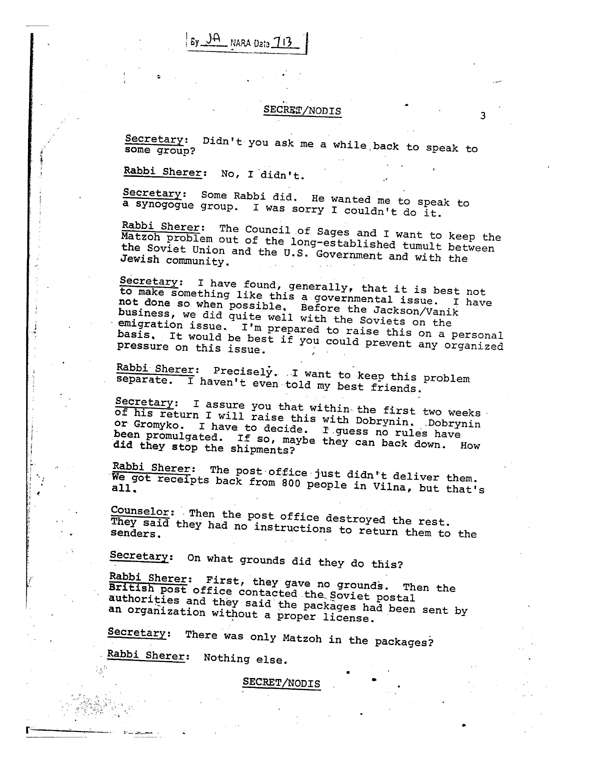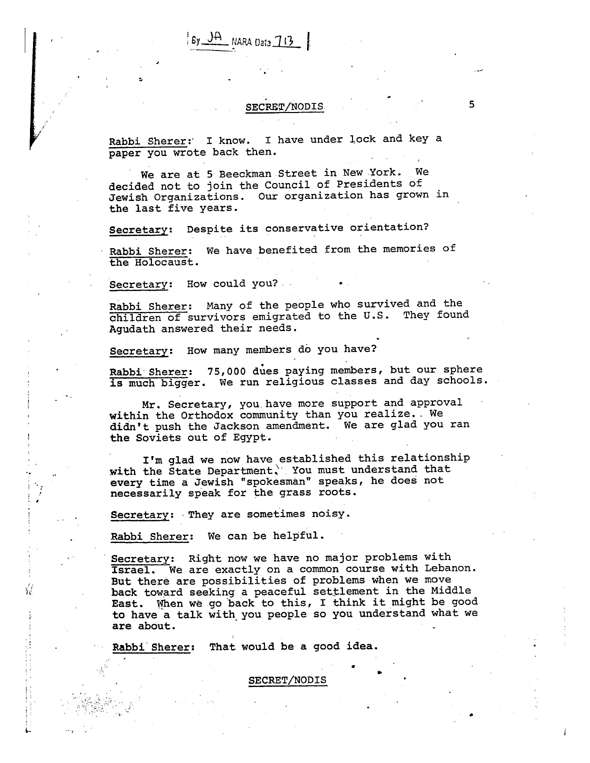In certain ways this document is a snapshot of the Agudah under Rabbi Moshe Sherer at that time ("both pro and con" as my friend put it). It really speaks for itself, and I don't want to inflict my interpretations onto readers, but it is my blog. Here are some thoughts:
- Rabbi Sherer repeatedly refers to the "Torah sages" privately; not only wasn't it just rhetoric for the masses, but he even brings them up in a closed meeting with the Secretary of State.
- Although I certainly don't want to give the impression that I am easy on Soviet persecution, it is interesting that this issue seems to concern extra special kosher matzah, as opposed to regular old kosher ones. Sherer agrees with Kissinger that matzah could be baked in the Soviet Union, but "because of our meticulous requirements, many people do not look upon it as kosher." Some might suggest that if kosher matzah was available, perhaps it wasn't worth making a big deal over. Of course he explicitly asks that the issue be separated from the normal Soviet Jewish issue, which shows that even though this was a question of frumkeit, he wisely tried to keep it from becoming a federal case.
EDIT: Rabbi Josh Waxman remarks that in 1973 someone he knows personally saw matzah baking in Odessa. There the vat in which the dough was being mixed was encrusted. Thus, those matzos were not kosher at all. Whether or not this was the case in Riga in 1976 is unclear, but it does not seem so unfair to assume it was. Thus this might not really have been a case of frumkeit and chumra, but rather of no kosher matzos really being available at all.This is not clear from the way it was discussed with Kissinger, but read with this additional knowledge it is possible to see that is what he meant.
- Rabbi Sherer's candid admission that the Agudah's growth in the prior five years was "despite [the Agudah's] conservative orientation" (Kissinger's words) but they did "benefit[] from the memories of the Holocaust," by which he means that the immigrant survivors and their children joined.
- Kissinger doesn't really seem to know who he is. He knows he is speaking to a rabbi, and he asks him which is his congregation. Rabbi Sherer reminds him that he is from the Agudah. Kissinger tells Sherer that he was in the Agudah as a child. Rabbi Sherer tells him that he knows all about it: there's a paper written by the child Agudist Kissinger kept "under lock and key." Someone who knows these things tells me that it is supposedly on yishuv ha-aretz, but of course it hasn't seen the light yet.
All in all, a pretty good picture of sincerity and diplomacy. The Holocaust statement is surprising, but it's not meant to say that they exploited the Holocaust. Rather it's an honest assessment, and he did not resort to exaggerated claims regarding the ideological importance or attractiveness of Agudath Israel to explain its growth. A window into the Golden Age of the Agudath Israel of America.





